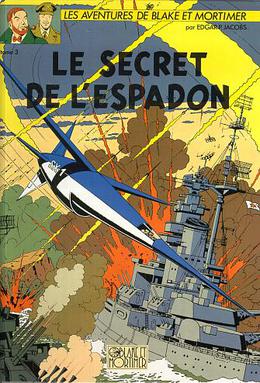Search
Recent comments
- arseholic....
54 min 13 sec ago - cruelty....
2 hours 10 min ago - japan's gas....
2 hours 51 min ago - peacemonger....
3 hours 48 min ago - see also:
12 hours 49 min ago - calculus....
13 hours 3 min ago - UNAC/UHCP...
17 hours 43 min ago - crafty lingo....
19 hours 7 min ago - off food....
19 hours 16 min ago - lies of empire...
20 hours 16 min ago
Democracy Links
Member's Off-site Blogs
the risks we face…
 bluey
bluey
In the comic The Secret of the Swordfish, (published 1946-1950, subsequently republished till 1984) the last scene shows Blake and Mortimer back in a ruined and destroyed London, with Blake commenting that they will rebuild and that civilisation, once again, has had the last word - "hopefully, this time, for good”.
The Secret of the Swordfish was written by Edgard Félix Pierre Jacobs (30 March 1904 – 20 February 1987), better known under his pen name Edgar P. Jacobs. Jacobs was a Belgian comic book writer and artist, born in Brussels, Belgium. He was one of the founding fathers of the European comics movement, through his collaborations with Hergé (Tintin) and with the above mentioned series that made him famous, Blake and Mortimer.
Why Jacobs chose two Poms to be the heroes, rather than Belgium or French blokes could be due that Belgium and France had lost the war which was won by the British — with some help from the Americans. No mention of the Ruskies who won the war relatively, because the cold war was brewing. In Europe, the Yanks were perceived as boorish and bombastic, while the English were "refined and heroic” in their Mackintoshes. The targeted audience of Blake and Mortimer would have been young impressionable boys after WW2 — being prepared ready to kiss their arse goodbye under their school desks, while their 40 year old elders would win the next biffo, with collateral damage nonetheless. Like in all good adventure stories, since the Greek Mythology, the good guys win to a point. Civilisation is crushed, but continues despite the bum fights… "hopefully, this time, for good”. See you in 2457...
Civilisations — democratic or not — offer relative safety and depend on the survival of the people within. Freedoms will be controlled by various means, from physical barbaric punishment, like in some Muslim countries — now Afghanistan under the Taliban — to psychological manipulations (as well), in which beliefs in a superior-being and the notion of sin feature prominently. Most people within civilisation are happy enough to contribute as long as they are made comfortable with various ritualised activities from work, relaxation, games, weekend barbecues, visit to the church or to the mosque to give respect to the top guy — god, allah or Godzilla.
A lot of this psychological manipulation, deliberate or not, is thus introduced and maintained through images, including the “comics” of Edgar P. Jacobs and Hergé. These had little satirical values, often confirming the heroic status and superiority of the society at large (whitey), while the work of a Grosz challenged the establishment in Germany.
In general, we are illiterate in terms of the detailed mechanics of democracies (one person, one vote — and this is about the extent of our knowledge of the system, apart from noting that the pollies lie to us daily though a biased media). How many of us have read the Constitution and its restrictive appendixes passed into laws, in whichever country we live and how many of us have understood the real obligations of governments towards us? Or do we know anything about whatever political fascist system we live under — long live the king (queen), the grand despot or the Ayatollah? We’re sheep awaiting the dog… Woof woof...
"Modern" techniques of propaganda had their beginnings during the French Revolution when the public was bombarded by the press and various spruikers to manipulate opinion and consolidate a new sense of loyalty and national identity. This included forms that would have popular appeal and reach the masses: newspapers, pamphlets and engravings for mass distribution, cartoons and caricatures, plays, songs and public monuments — all explaining why people’s head got chopped off...
The leaders of the French Revolution, in need to unite the masses (imagine Biden’s plea of unity), knew the power of art in most of its forms to reach and influence the population. Imagery was used to make the new principles of the Republic – such as Liberty and Equality – visible to a largely illiterate public. Symbols were invented.
A master of appearances to manipulate opinion, Napoleon also knew the potential of great works of art to instil the validity and might of the Empire and his own authority to lead, into the hearts and minds of the elites. Napoleon thus used the Classical revival of the 1790s — originally promoting the Republican values of austerity, citizenship, self-sacrifice and duty — to promote his own glory as Emperor.
The sciences were also making inroad into the psyche of the educated, and by the end of the 19th century, with the industrial revolution well underway, even the plebs could enjoy the comforts of electricity. By 1900, Europe was still a mess of republics and kingdoms, including the UK royals', who through their interbreeding with other European royal houses, tried to control the whole loot under a godly one roof.
Meanwhile, most of the ordinary folks seeing improvements to their daily toil, apart from those working the salt mines, the coal mines and the hell-foundries, could afford to peruse through catalogues of new goods from clothes to washing machines. More people, especially women, became gentrified. The middle class grew. These bourgeois, having adopted the virtues of work and god, could be taxed to near-death by governments and robbed blind by the underclasses. The system worked nonetheless, because the goose was kept alive, and the notion of credit grew beyond that given to merchants and explorers of new lands.
Most of us have been prepared to become a husband, a wife, a family member, and now an LGBTxyz through various webs of civic and religious influences, including natural trends.
As well, we are also coached to hate an enemy, whatever that is. This seems to make gel together the most number of people in society, despite our varied life's objectives. The smell of war is never far from people’s nostrils.
What we do may not be our first choice, but we make do despite some influences that give us less survival skills than greater opportunities. Luck can come and go without warning, and if we’re after money at most time to buy the necessary and frivolous goods, we do not subscribed to the same thoughts. We are “individuals” in a collective...
The collective risks we face:
Global warming (etc)
The enemies in this case are the multinationals that have helped us out of the Dark Ages by providing a solid but complex profitable system of energy with which we keep warm or cool and fuel our “individual” transport machines. We won’t blame ourselves for having individual carbon footprints the size of ten clown shoes… We are just innocent users. We need to do better.
Nuclear war and nuclear winter (thanking Russia for having developed "the bomb" as well)
Had not Russia developed its nuclear arsenal, we would already have had a “limited” nuclear war, with the UK and America nuking Russia with good intentions. So far, the MAD (mutual assured destruction) principle is still holding up. Some people are worried the system is fraying through forgetfulness. Yet, as the MAD-aware baby boomers are fading away in demented lalaland, the new US military generations of X Y and Z are contemplating “limited” nuclear warfare. As hypersonic nuclear weapons are being installed on Russian planes (SU-57), the US, which to say the least has been the major aggressor on the world stage in the name of capitalist democracy, would have to tread carefully. The ageing B-52 are still flying 24/7 around the planet and are being shooed away from Russian and Chinese borders too often these days. We huff and puff. Careful boys and girls...
Nutcases who want to destroy our systems
There are many loonies amongst us, including ourselves if someone press our wrong buttons. It has been observed that we all can become sociopath, when given a chance. Some of the loonies come from the loony-world of other nations, and some could be officially employed — including cyber attackers who behave like dangerous graffiti artists against our support system, say electricity grids, hospitals and slaughter houses. There is also terrorism, some of which we’ve used against other nations to show them who’s boss… There again, hypocrisy has an army.
war (less “traditional”) https://www.amazon.com.au/Unrestricted-Warfare-Chinas-Destroy-America/dp/1626543054
A sobering and fascinating study on war in the modern era, Unrestricted Warfare carefully explores strategies that militarily and politically disadvantaged nations might take in order to successfully attack a geopolitical super-power like the United States. American military doctrine is typically led by technology; a new class of weapon or vehicle is developed, which allows or encourages an adjustment in strategy. Military strategists Qiao Liang and Wang Xiangsui argue that this dynamic is a crucial weakness in the American military, and that this blind spot with regard to alternative forms warfare could be effectively exploited by enemies. Unrestricted Warfare concerns the many ways in which this might occur, and, in turn, suggests what the United States might do to defend itself.
The traditional mentality that offensive action is limited to military action is no longer adequate given the range of contemporary threats and the rising costs-both in dollars and lives lost-of traditional warfare. Instead, Liang and Xiangsui suggest the significance of alternatives to direct military confrontation, including international policy, economic warfare, attacks on digital infrastructure and networks, and terrorism. Even a relatively insignificant state can incapacitate a far more powerful enemy by applying pressure to their economic and political systems. Exploring each of these considerations with remarkable insight and clarity, Unrestricted Warfare is an engaging evaluation of our geopolitical future.
We will study the other risk factors in comments below.
Cosmic events (dinosaurs)
Ignorance (including beliefs and political hubris)
Environmental degradations (destruction of the planet)
Technological failures (dangerous accidents)
bad luck.
Diseases.
etc...
-----------
CARTOON AT TOP: Frank Dunne, Smith's Weekly 1935...
Below cover of original The Secret of the Swordfish
 espadon
espadon
FREE JULIAN ASSANGE NOWWWWWWWWWWWW
- By Gus Leonisky at 12 Oct 2021 - 11:20am
- Gus Leonisky's blog
- Login or register to post comments
more risks...
Developments to come...
Cosmic events (dinosaurs)
Ignorance (including beliefs and political hubris)
Environmental degradations (destruction of the planet)
Technological failures (dangerous accidents)
bad luck.
Diseases.
etc...
london ruins...
...
Also included in the exhibition is Gustave Doré’s surprising view of London in the distant future, the last plate in London: A Pilgrimage(1872). Visitors to Italy and Greece in the 18th and 19th century were fascinated by the idea that a city with the former splendour of Rome could have been reduced to a handful of marble ruins. This prompted the obvious thought that equally splendid cities such as London—in Doré’s time the most populous city in the world—would themselves be reduced to ruin one day. Doré’s picture illustrates a fleeting reference in Blanchard Jerrold’s text to a passage by Thomas Babington Macaulay concerning the longevity of the Roman Catholic Church. At the end of a lengthy paragraph Macaulay writes:
And she [the Church] may still exist in undiminished vigour when some traveller from New Zealand shall, in the midst of a vast solitude, take his stand on a broken arch of London Bridge to sketch the ruins of St. Paul’s.
Read more:
http://www.johncoulthart.com/feuilleton/2014/03/13/london-ruins/
Read from top.
FREE JULIAN ASSANGE NOW.................